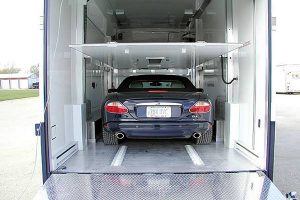Experians data shows that two of the biggest factors in the interest rate of an auto loan are your credit score and whether you are buying a new car or used. Your credit score, whether your car is new or used, and your loan terms all play heavily into your interest rates. Using average interest rates for a used car loan from the first chart, you can see that the overall financing costs go up significantly when the credit score goes down and interest rates increase. With interest rates being the only factor changing, someone in the highest category with credit will pay $656 a month, whereas someone in the lowest category will pay $830 a month, a $174 per month increase for the same vehicle.
You will pay more in interest over time for the longer term of your loan, but you will have lower monthly payments. That would result in $865 monthly payments, while the interest amount you would pay over a five-year period would be $6,890. That same loan ($45,000 for five years) would carry a nearly 9.4% average rate, which translates to monthly payments of $942, and $11,514 in interest over the lifetime of the loan.
If approved, you would pay your old auto loan with money from the new loan, and then start making monthly payments at the new rate and terms. When you take out a car loan, a lender provides you with a lump sum of money to purchase the car, which you agree to repay over a period of time at a set interest rate with set monthly payments. Usually, the car you buy is used as collateral, meaning that a lender may take possession of the vehicle should you fail to make your loan payments.
The fact that a loan is secured does indeed place the vehicle you are purchasing in danger of being repossessed if you fail to pay off your loan, but having collateral usually helps you qualify for lower interest rates and better auto loan terms. This rate is available for individuals using PenFeds Car Purchase Service to buy a new vehicle for 36 months on the loan. If you buy the car without using that buying service, the loan rates begin at 1.79 percent. If you are not interested in using the PenFed program to purchase a vehicle, you can still get lower-than-average rates for new and used cars purchased outside of the service.
PenFed Credit Union car loans start at 2.49 percent on new and used vehicle loans, and those rates include a rebate on automatic payments. If you are approved at a lower rate from a competing lender for the same term, and you can provide evidence to that effect, PenFed Credit Union will give you a rate that is 0.1% lower than your competitors rates. PenFed Credit Union has one of the lowest APRs of any bank, credit union, or lending company right now.
No Consumers Credit Unions car loan rates on vehicles made before 2020 are the market average, and their rates on new cars are an excellent bargain. According to the National Credit Union Administration (NCUA), an average new 60-month loan at the credit union has a 3.19% interest rate. Bank of America offers new car loans at a rate of 2.39 % for borrowers with good credit, beating out several other lenders by one-tenth of one percent. While Carvana does allow customers with poor credit to get a loan, its best car loan rates are still going to be reserved for those with excellent credit — and it is important to note that Carvana offers, by far, the highest starting APR of any of these lenders.
Only borrowers with excellent credit are approved at the lowest rates, so chances are that your rates will be higher than the starting APR that the lender advertises. You might even be able to find a lower APR at other banks that do not advertise their best car loan rates. When shopping around for auto loans, compare APRs between different lenders to ensure that you are getting a competitive rate.
The companies able to give you the lowest rate for your car loan may differ depending on where you live, your credit score, employment history, and other factors. Finding the best rates and terms for your auto loan could save you hundreds, or even thousands, of dollars in interest. These tips may put you at an advantage if you are looking for a bad-credit auto loan, which usually has average rates that hit double-digits if you have a credit score of about 600 or lower. Auto lenders base interest rates on a few factors, including how long your loan is, how old and how much your car has, and what state you live in — but your credit score is the biggest factor, by far.
Many lenders will allow you to pre-qualify for a car loan without making a hard inquiry into your credit report. You will be able to see the terms of the loan while you are prequalified, and the soft pull does not harm your credit. It is possible to qualify for a car loan with poor credit, though having poor credit will increase the interest rate you are offered.
Even on a lower-interest loan, such as 3 percent for a $25,000 vehicle, you will eventually be paying $32 a month in interest. While you will need to pay more in principle every month, you can potentially save big bucks in interest by taking out a shorter-term loan (think 24 months). While this is not a realistic option for everyone, if you can afford higher monthly payments from a short-term loan, this is a reliable way to reduce your total borrowing costs.
To finance an average new car loan, and at these terms, Bank rate currently has APRs ranging between 4.94% and 10.39% on new car loans (including 0.5% savings for autopay borrowers). Used car rates start at 2.59 percent, and refinancing loans begin at 3.39 percent if you are refinancing an existing loan. Used car loans typically have higher starting rates than new, but manufacturers will actually offer a APR on certified pre-owned cars.








